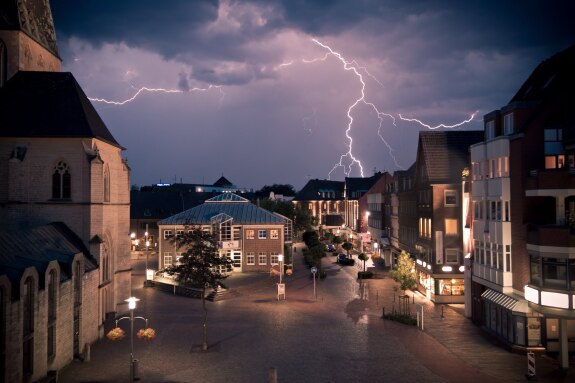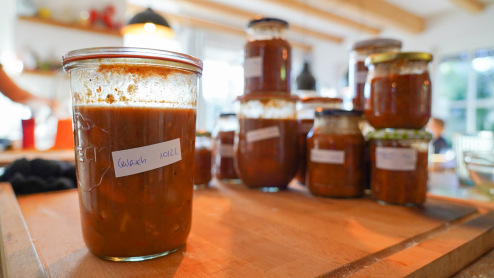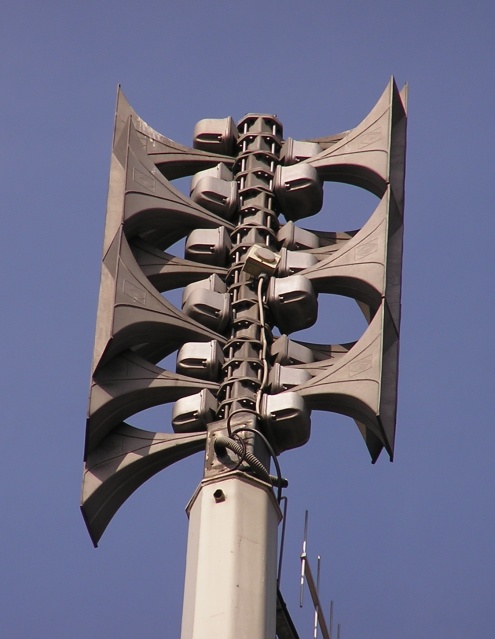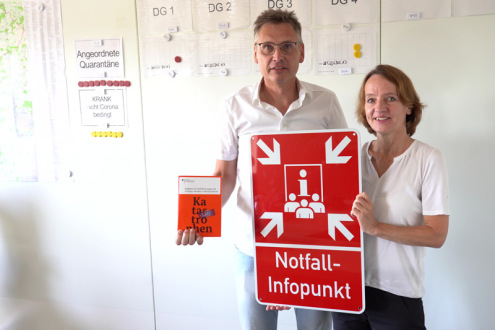Crisis
What to do when the going gets tough?
What if the power suddenly goes out or there is a flood or other unforeseen event? On this page you will find information, tips on what to do and important contacts in the event of an emergency situation - and how to prepare for an emergency.
In this context, the city administration of Bocholt has set up this page and developed recommendations for preparing for a possible crisis scenario based on the topic page "Akut" of the Borken district and the general recommendations of the Federal Office of Civil Protection and Disaster Assistance (BBK).
Of course, in the event of a major emergency situation, state aid will also be provided. Nevertheless, in the event of large-scale damage situations, emergency services cannot be everywhere at the same time. "If you are prepared, you can help yourself, your relatives and neighbours until government aid arrives and reduce damage with protective measures", according to the BBK website.
Warnings via social media
Citizens can find out about crises via the following channels:
-
to the
- WhatsApp channel
- Instagram profile
- Facebook page
Stock up on food and drinks
Is an emergency supply of food and drink really useful? One thing is clear: In individual cases, situations may arise in which a moderate stock of food and drink can be helpful.
A good example of this is hurricane "Friederike" (2018). At that time, there were power cuts in individual regions, some of which lasted for days. In such cases, supermarkets remained closed and chests and fridges were out of action. Another example is a quarantine ordered by the health authorities: here too, a stock of food can help to avoid risky contacts.
How much food or drink you want to stockpile is a very individual decision. Nevertheless, the Federal Office of Civil Protection and Disaster Assistance has compiled some general tips for the right stockpile for orientation:
- An emergency stockpile should hold enough food and drink for ten days.
- This means that two litres of liquid per person in the household should be stored per day . Important: Water is not only needed for drinking! If the tap water supply fails, water is also needed for cooking.
- The rule of thumb for food is: about 2,200 kcal per person per day.
- Follow the principle of "living stock", i.e. integrate the stock into your everyday food consumption. This will help you avoid expired food.
- Build up your emergency stock little by little! It is not necessary to buy everything "in one go" - instead, take a little more with you each time you go shopping. This helps to avoid supply shortages.
- Store food properly, i.e. in a cool, dry and preferably dark place. Make sure the packaging is airtight.
- Don't forget your pets either! Emergency supplies also include pet food, bedding and necessary medication for dogs, cats and other pets.
The BBK provides detailed tips on the right emergency supplies on its website.
The sensible medicine cabinet
If you are unable to leave your home in an acute emergency (such as a severe storm), a well-stocked first-aid kit can help treat minor injuries or minor illnesses.
The following applies to medicines: stock up before they are used up - and pay attention to any expiry dates.
According to the BBK, the medicine cabinet should contain
- Personal medication prescribed by a doctor
- Painkillers and antipyretics
- Remedies for colds
- Remedies for diarrhoea, nausea and vomiting
- Remedies for insect bites and sunburn
- Electrolytes to compensate for diarrhoea
- Clinical thermometer
- Splinter tweezers
- Skin disinfectant
- Wound disinfectant
- Disposable gloves
- Respirator mask
- Dressing material
When storing medication, it is important to note that medication must be kept in a lockable compartment and out of the reach of children. Medication should also be stored in a cool and dry place.
Here you can download a checklist from the Federal Ministry for compiling an emergency supply.
Siren alarm! What now?
You hear a siren sound and don't know what it means? You can recognise the meaning by the type of signal tone:
-
1
- minute continuous tone with two interruptions: alerting the fire brigade. Note: As a rule, the emergency services in Bocholt are not alerted via sirens.
- In the meantime, the emergency services are primarily notified and alerted via app and message receivers.
- minute continuous tone: After the emergency services have been alerted, this is the associated all-clear signal.
- minute increasing and decreasing signal: This is a siren alarm as a warning for the population. In this case, the following applies:
Correct behaviour in the event of a siren alarm for the population:
-
Switch
- on the radio! In the event of a crisis, relevant information is disseminated via the radio stations.
- You can reach the local radio station for the region (Radio WMW) in Bocholt via the VHF frequency 88.4 Mhz.
- the website www.bocholt.de.
- Current emergency information is published there in the event of a crisis on an upstream emergency page.
- calm!
- Only call the emergency number if there is an acute emergency.
Further information on the net
Further information on the siren alarm can be found on the website of the Ministry of the Interior of North Rhine-Westphalia.
Help at emergency info points
In the unlikely event that a longer-lasting emergency situation does occur, for example in the event of a prolonged, widespread power outage, the emergency info point concept applies throughout the district - and therefore also in Bocholt.
What are emergency info points?
The emergency info points are locations that are set up at short notice throughout the city in the event of an emergency. Citizens can receive minor assistance there and have the opportunity to make emergency calls if the telephone and/or mobile phone network is disrupted in the event of a power cut.
The city of Bocholt has procured emergency diesel generators for the emergency info points in the event of a crisis. In the event of a prolonged power outage, these should help, among other things, to keep communication channels open between the info points and higher-level authorities (such as the Borken district).
This is what emergency info points offer:
- Reporting centre for emergencies/emergency calls (replacement for 112/110)
- Up-to-date official information on the overall situation
Important: No accommodation (sleeping facilities) or food supply is provided at the emergency info points, and initially no supply of emergency power or hot water (only when the situation worsens in further expansion stages).
The emergency info points are expressly intended for acute emergencies!
As things stand at present (February 2023), emergency info points will be set up at the following locations in Bocholt in the event of an acute emergency
- Mariengymnasium Bocholt
- Gym, Liebfrauen primary school in Barlo
- Gym, Liebfrauen primary school in Stenern
- Gymnasium, Euregio-Gymnasium
- Gym, St Bernhard primary school in Lowick
- School building, Biemenhorst primary school
- Spork hall
The fire station on Dingdener Straße, the fire station in Suderwick and the police station on Dinxperloer-Straße are also available for emergencies.
Map with emergency info points in the Borken district
Here you will find an overview of current emergency info points throughout the Borken district. The emergency info points are being dynamically expanded so that further locations will be added gradually.
Questions and answers
Where can I find more information on this topic?
You will find further important tips and information on the following pages:
- akut.kreis-borken.de | Information page of the Borken district with crisis information
- Federal Office of Civil Protection and Disaster Assistance (BBK)
Is there information material to download?
The Federal Office of Civil Protection and Disaster Assistance has compiled a comprehensive brochure with crisis information and behavioural tips.
This can be downloaded here (click here.)
Where can I get advice on the right pension provision?
Citizens who have questions about emergency preparedness and self-protection can use the free advice hotline of the Federal Office of Civil Protection and Disaster Assistance.
This is available Monday to Friday between 9 a.m. and 3 p.m. on the telephone number
(0228) 99 550-3670
can be reached.
Energy-saving tips for everyday life
Costs little and brings a lot
Here you will find practical tips that you can implement immediately to reduce your energy costs and consumption in everyday life. (Source: Federal Ministry of Economics and Climate Protection)
Do you have any further questions?
Dieter Helbig
Allgemeine Ordnung, Gewerbe und Wahlen
Öffentliche Ordnung
Send e-mail
+49 2871 953-2104
Markus Telahr
Allgemeine Ordnung, Gewerbe und Wahlen
Öffentliche Ordnung
Send e-mail
+49 2871 953-2110










